- Home
- Andrea Penrose
The Cocoa Conspiracy lahm-2 Page 3
The Cocoa Conspiracy lahm-2 Read online
Page 3
The buzz of conversation grew louder as yet another small group made its way into the room.
“That is the party from Paris,” said Saybrook. Like them, most of the guests had arrived at the country estate that afternoon. “Beaulieu, an old Royalist, will be part of Prince Talleyrand’s delegation in Vienna. But he has come to London to confer with our Foreign Ministry and the émigré leaders here in London before traveling on to the Continent. To his right is Flambert, a former colonel in Napoleon’s Imperial Guards.”
“Sandro, you must remember that I was raised in the West Indies, where Europe and its wars seemed very far away,” replied Arianna. “I need some help in understanding the complex politics and alliances. Royalists, émigrés, Talleyrand—you must explain to me what they all stand for.”
“Sorry,” he said with a wry smile. “I shall try to explain things simply. You know, of course, that in 1789, the French people rose up in revolution and beheaded King Louis XVI and his queen, Marie Antoinette, several years later, along with a great number of the old aristocracy. The Bourbon dynasty had ruled France since the 1500s, but now it was gone in a wink of steel. A democratic republic was declared, which frightened the rest of Europe, and so France was attacked by a coalition of its neighbors. For over two decades, the continent has been torn by conflict, and once Napoleon came to power in France and declared himself emperor, the wars escalated. Now that he has finally been defeated and exiled to the isle of Elba, there is a complicated jockeying for power, both within France and across the Continent.”
“I see,” she murmured. “Perhaps I should be taking notes.”
“It does get rather complicated,” said Saybrook. “The Royalists are those who remained loyal to the Bourbon dynasty, and are now happy that it has been restored to the throne of France. In general the émigrés—that is, the French who fled here to England to escape the Revolution—are Royalists. But the former supporters of Napoleon aren’t happy that the Bourbon dynasty has been returned to power. They would like to see a different form of government established, one where the people have more of a voice.”
He took a look around the room before going on. “That is just one of the many issues that will be decided at the upcoming Peace Conference in Vienna. Prince Talleyrand, the current Foreign Minister of France, will be leading the negotiations for his country. He is clever, cunning and a master of diplomacy. The other main powers at the Conference will be England, Russia and Austria. You will meet some of their representatives here tonight.”
“I shall endeavor to keep all of this straight,” said Arianna. “Though in truth, I find politics an ugly game.” Her gaze shifted to an extremely handsome gentleman who had just turned away from Beaulieu and Flambert in order to bow over their hostess’s hand.
“Who is Adonis?” she asked, finding it hard not to stare. Like a Greek god, the man possessed striking classical good looks—curling ringlets of golden hair framed chiseled cheekbones, a straight nose and a full-lipped, sensuous mouth.
“Le Comte de Rochemont.” Saybrook paused. “Who, like you, believes that he is blessed with Divine Beauty. Along with a cleverness that puts Almighty God to blush.”
“I take it you don’t like him,” she murmured.
“I think that he’s a bloody, brainless ass,” responded Saybrook.
Seeing as he felt that way about most of the haut monde, Arianna took the assessment with a grain of salt.
“He’s considered an influential member of the French émigré community here in London, on account of his family, a very prominent and well-connected member of the old nobility,” continued Saybrook. “But as far as I know, the comte spends most of his time gambling or bedding other men’s wives.”
“So does most of the English aristocracy,” Arianna pointed out.
“Pas moi,” muttered Saybrook.
“Not every man is capable of matching your prodigious skills in the . . . kitchen.”
He choked down a laugh. “Some men might be offended by that remark.”
“But not you, for you know I adore your chocolate confections.” She placed a gloved hand on his sleeve. “Now come, we might as well go feed ourselves to the lions.”
“You mean the carrion crows.” He looked at the flock of black-coated diplomats with distaste. “Who plan to peck away at a war-ravaged Europe, in order to feather their own nests.”
“Try not to be so cynical, Sandro.”
“That is rather like the pot calling the kettle black.”
“True, but we promised your uncle to help create a mood of international camaraderie.” The reminder was as much for herself as for him. “So we must make the best of the situation while we are here.”
“Yes, yes, you are right, of course.” And yet he looked a little unsettled. A little on edge.
Why? Arianna considered herself very skilled at reading people, and now that she had settled into marriage, she felt that she was learning to interpret the nuances of his moods. But this one was puzzling her. She couldn’t quite put a finger on what was troubling him. A glance at his downturned face was no help. The light from the gilded sconces couldn’t penetrate the fringe of dark lashes shadowing his eyes.
However, further reflection was interrupted by Saybrook’s uncle, who stepped out from one of the side salons.
“Ah, there you are, Sandro.” Mellon acknowledged her presence with a small nod. “Milady.”
She repressed an inward sigh. The fortnight was already promising to be a long and tedious affair.
“I trust that you had a pleasant journey from London,” Mellon went on politely.
“Quite,” she responded.
“Excellent.” Mellon’s eyes had already shifted to Saybrook. “Might I steal your husband away for a moment? The Spanish diplomats have just arrived and I would like to make the introductions.”
“Of course. You need not worry about me, sir. I can fend for myself.”
Mellon’s mouth twitched slightly, but whether in annoyance or amusement, it was impossible to discern.
Arianna guessed the former. The allusion to her less than ladylike past was not apt to elicit a chuckle.
Saybrook shot her a look of silent apology and then gestured for his uncle to lead the way. “I shall do my best to appear simpatico.”
As the two men moved off, Arianna turned toward one of the colonnaded alcoves and began perusing the collection of oil paintings hung on the oak-paneled walls.
I would be happy to blend into the woodwork, she mused. The superficial pleasantries of Polite Society always seemed to stick in her throat . . .
“Ah, the elusive Countess of Saybrook.”
Arianna didn’t need to turn around to recognize who was speaking.
“Why does it not surprise me to find you skulking in a dark corner?” Lord Percival Grentham asked, his voice deceptively soft as he glided a step closer to her.
She turned slowly, refusing to flinch. The Minister of State Security, Grentham was feared by most people in London. And with good reason. He was said to be utterly ruthless and remorseless in pursuing those whom he considered a threat.
A threat to what? King, Country, or his own overweening pride?
He looked at her as if horse droppings had suddenly befouled his elegant evening shoes.
She returned the stare with equal disdain. I don’t like you much either.
A master of manipulation, Grentham liked being in control of people. To him they were pawns, insignificant pieces to be sacrificed without a second thought to serve his own purposes. And so he harbored a simmering enmity for her and Saybrook, despite their having saved him from considerable embarrassment by unmasking a dangerous conspiracy. Their refusal to play by his rules had resulted in a veiled warning that he was watching . . . and waiting to pounce if they made the slightest slip.
As their gazes locked, a glint of malice lit in his eyes. “I trust you are not here to cook up any new trouble?”
“No, I shall leave making a hash of thing
s to you, sir.” She smiled sweetly on seeing a tinge of color rise to his cheekbones.
“A hash calls for dicing a slab of flesh into mincemeat, does it not?” replied Grentham. “I prefer a more sophisticated style of cuisine. One that requires delicate carving skills . . .” His well-tended fingers flicked at his lapel. “Rather than a few heavy hacks with a cleaver.”
Arianna had stabbed a man to save Saybrook’s life, and the minister knew it. But she would be damned if she let him guess that the memory still gave her occasional nightmares.
“Ah, yes,” she riposted. “I’ve heard that you have a great deal of experience in roasting a man’s cods, and then slicing them into amuse-bouches.” It was, she knew, childish to provoke him. But she couldn’t help it. “Tell me, do you spice them with oregano or rosemary? Or do you serve them plain, with naught but a sprinkling of salt?”
“You have a clever tongue, Lady Saybrook,” replied Grentham softly. “Have a care that it doesn’t land you in a vat of boiling oil.”
He moved away without further comment as a shadow fell across the recessed corner.
“Was that self-important prig harassing you?” demanded Saybrook in a low growl as he came up behind her.
Arianna shook her head. “The minister and I were simply exchanging pleasantries.”
Her reply elicited a phrase unfit for the elegant surroundings.
“There are ladies present,” she cautioned. “Not that such language offends my ears. But I daresay that the others would fall into a swoon were they to overhear you.”
He chuffed a disgruntled sigh.
“Speaking of ladies, I can’t help but be curious—is Lord Grentham’s wife here?” She wondered what sort of female could live with such an unrelenting lack of humor.
“I believe he’s a widower,” replied Saybrook.
Arianna suspected that the minister was standing on the other side of the tall Chinoiserie curio cabinet, and couldn’t resist a parting dig. “Ha. My guess is he either tortured the poor woman in some foul dungeon. Or”—the pause was deliberately drawn out—“she simply expired from boredom.”
Saybrook gave a chuckle.
“Honestly,” she went on. “Does the man think of nothing but work, and how he can persecute the people around him?”
“It’s his job to be a nasty, nosy son of a bitch. And he does it extremely well.” Her husband disliked the minister even more intensely than she did. He hadn’t revealed the reason, but she guessed it was very . . . personal.
“Forget Grentham,” muttered Saybrook. “Come, let us mingle with the other guests and be polite.”
Rochemont, the French Adonis, was engaged in conversation with the Duke of Ellis and two military officers from the Horse Guards. As she passed close by, Arianna heard him describing a hunting trip to Scotland.
“The Paragon of Masculine Beauty appears to speak perfect English,” she observed.
“The comte has lived in London for nearly two decades,” answered her husband.
“He must be delighted to see Napoleon exiled and the House of Bourbon restored to the throne of France,” she mused.
Saybrook shrugged. “I would imagine it all depends on how power shifts. No one likes to lose his position of influence. The British government treated the émigré community in London as an important ally. Now that there is no Napoleon to fight against, Rochemont and his followers might become irrelevant.”
“I hadn’t thought of it in that light.” Arianna pursed her lips, finding it hard to understand the allure of the political world. As Saybrook said, it must all come down to a craving for power.
While, I, on the other hand, satisfy my innermost desires with chocolate.
“What has stirred such a cat-in-the-cream-pot smile?” inquired Saybrook, arching a dark brow.
“I was giving thanks to God that we will not have to be involved in all the sordid machinations.”
“Amen to that,” replied her husband. He plucked two glasses of champagne from the tray of a passing waiter and handed one to her. “A toast to the quiet life of cooking and scholarly study.”
The wine’s effervescence prickled against her tongue. “You are sure that it’s not too quiet?” she asked softly. “I sometimes fear that you miss having a complex conundrum to solve.”
“I don’t miss whizzing bullets and slashing steel,” he quipped.
And yet, she wondered . . .
“Ah, there you are, sir!” Their host, the Marquess of Milford, flashed a genial smile at Arianna. “Lady Saybrook, would you allow me to take your husband away to the terrace for a moment? Mellon tells me he knows something about plants, which is a godsend. The Spaniards are asking me all sorts of questions about my ornamental gardens, and I haven’t a deuced clue as to the answers.”
“His Lordship is indeed an expert in botany,” she replied. “I’m sure he’ll be able to help. In the meantime, I won’t wilt while he’s away.”
“Wilt . . . Oh, ha! ” The marquess gave a bark of laughter. “Clever gal you’ve married, Saybrook.”
“Yes,” said Saybrook drily. “Isn’t she?”
Left alone once again, Arianna looked around, wondering if there was a familiar face among the guests. Other than Saybrook’s uncle—and the odious Lord Grentham—she had seen naught but strangers.
The marquess’s wife had led a group of ladies into the adjoining salon and Arianna decided that it would be rude not to join them. Steeling herself for a detailed discussion on the state of the weather, or whether cerise or plum was a more fashionable color for autumn, she started to make her way across the room.
“Please forgive the demands on Sandro.” Mellon appeared by her side and offered his arm. “His attentions will make the Spaniards happy, though it rather leaves you in the lurch.”
“You need not keep apologizing, sir. We are here to help you foster the bonds of international friendship.” She dutifully smiled at a passing foreigner. “If there is anything I can do, you have only to ask.” Knowing his reservations, she decided to confront them head-on. “I can behave like a perfectly proper lady when I put my mind to it.”
His arm stiffened beneath her gloved hand.
Apparently I was much mistaken. A proper lady would have known better than to express such frankness . . .
To her surprise, Mellon actually chuckled. “I imagine that you could do just about anything that you put your mind to.”
“I’m not sure if I should take that as a compliment,” replied Arianna lightly. Or perhaps as an olive branch?
Mellon had no chance to reply for he was accosted by a very large and very plump gentleman with the most extraordinary set of side-whiskers that Arianna had ever seen. The wild frizz, heavily sheened with Macassar oil, covered all but a scant strip of smooth flesh at the tip of his chin. It gave him the look of a slightly demented bear.
“For shame, Mr. Mellon! You are taking unfair advantage of your foreign visitors.” The heavily accented English was punctuated by a waggling finger. “Do you mean to keep your lovely relative all to yourself?”
Mellon acknowledged the accusation with a courtly shrug of surrender. “Not now that I’ve been caught out, Grimfeld. But can you blame me?”
“Nein,” responded the Bear with an appreciative look her way. “I would do the same if I were in your sows.”
“Shoes, Heinrich, not sows,” corrected one of his companions. “Sows are schwein.”
“Lady Saybrook,” said Mellon, keeping a straight face. “Allow me to present Herr Grimfeld, who is part of the Prussian contingent visiting London, and Count Kostikov, who represents His Imperial Highness, the Tsar of Russia.”
Both gentlemen bowed low over her hand.
“May I also have the honor of introducing my countryman,” said Kostikov as he straightened and stepped back to permit the third member of their group to approach. “Mr. Davilenko has served this past year as our government’s attaché in London, but he will be traveling with me to Vienna as part of our peace
delegation.”
“What a great pleasure it is to make your acquaintance, madam,” said Davilenko, moving quickly to perform the gentlemanly ritual of brushing a kiss to her glove.
Arianna stared in mute shock at the top of his head. The curling russet-colored hair, the bald spot on his crown, the jug-shaped ears . . .
For an instant she wondered whether she had drunk too much champagne for the floor suddenly seemed to be spinning beneath her feet.
“It is a privilege to be in the presence of such a lovely English rose,” Davilenko went on.
And yet last time we met, you called me a poxy slut.
Ending his gallantries with a flourish, he clicked his heels and looked up.
Arianna held her breath in her lungs.
“A rose,” he repeated, his broad smile mirroring the upturned slant of his cheekbones. “And one of the most exquisite, enchanting blooms of this island’s beauty.”
Apparently, beauty was in the eye of the beholder, she thought sardonically, realizing that he didn’t recognize her. Tonight she was swathed in costly silks, with a king’s ransom in emeralds dangling just above her décolletage. While during their previous encounter in Messrs. Harvey & Watkins Rare Book Emporium she had been wearing a drab bonnet and ill-fitting work gown.
Looking somewhat bemused by her wide-eyed silence, Mellon gave a discreet cough. “A very pretty compliment, sir.”
“Yes, how kind of you, sir,” she murmured, roused from her initial shock by the gentle reminder. Quelling the insane urge to laugh—and then give the leering Russian a good, swift kick in the crotch, Arianna fluttered her lashes. “Have you an interest in plant life, Mr. Davilenko?”
“I consider myself a connoisseur of beautiful blooms,” he replied jovially, oblivious to her subtle barb. Casting an appreciative glance at her bosom, he added, “If you would allow me to escort you to the refreshment table, we might discuss the subject at greater length.”
Accepting his arm, she let him guide her around an arrangement of potted palms.
“I have noticed that English ladies are very fond of flowers,” said Davilenko. “Have you a favorite, Lady Saybrook ?”

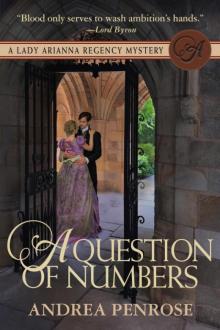 A Question of Numbers
A Question of Numbers Murder at Queen's Landing
Murder at Queen's Landing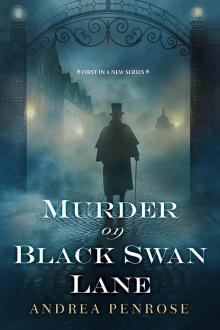 Murder on Black Swan Lane
Murder on Black Swan Lane Sweet Revenge
Sweet Revenge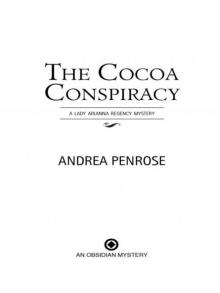 The Cocoa Conspiracy
The Cocoa Conspiracy Smoke & Lies
Smoke & Lies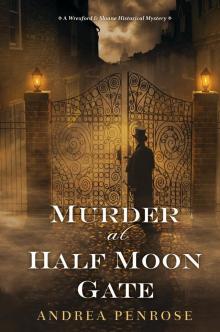 Murder at Half Moon Gate
Murder at Half Moon Gate The Stolen Letters
The Stolen Letters Sweet Revenge lahm-1
Sweet Revenge lahm-1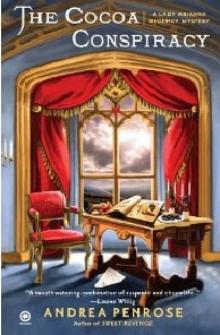 The Cocoa Conspiracy lahm-2
The Cocoa Conspiracy lahm-2